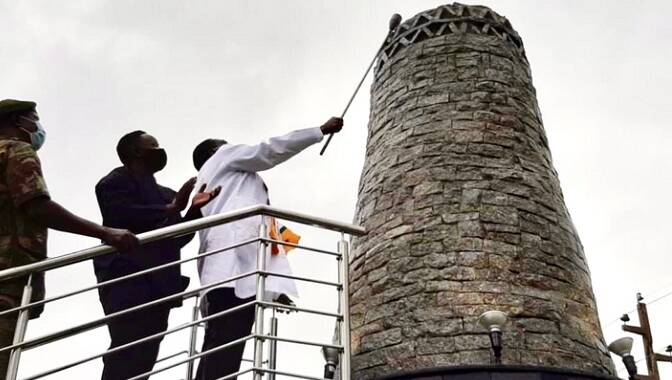
The Sunday Mail

Talent Mudenda
ONGOING initiatives championed by President Mnangagwa’s administration to establish the Museum of African Liberation in Warren Park, Harare, are a momentous step towards decolonising our history and telling our story from an African perspective.
For too long, the narrative about Africa’s past has been defined by colonial powers seeking to justify subjugation of the continent.
But now, under the astute leadership of the President and renowned intellectual Ambassador Kwame Muzawazi, the CEO of the Institute of African Knowledge (INSTAK), we are reclaiming the platform to shape how our liberation history is remembered. The museum — to be located in the sprawling 103-hectare Liberation City, a stone’s throw away from the National Heroes Acre — will serve as a central repository in honour of the struggle for independence across Africa.
It will archive documents, photos, videos and artifacts chronicling the revolutionary movements and the heroes who broke the yoke of colonial bondage.
Most notably, the museum plans to actively reach out to different African countries so that they contribute their pieces of history.
This Pan-African approach is crucial if we are to consolidate a shared narrative as one people with one destiny.
For far too long, Europeans have told superficial stories about African “tribes” or framed our history as a footnote in their own rise and domination of trade routes.
Books in their museums and universities subtly or brazenly pushed myths that wrongly portrayed African culture as being backward and inferior.
The Museum of African Liberation will give voice to our forebears who fought relentlessly to end this injustice. They include Samora Machel, Nelson Mandela and Kwame Nkrumah.
It will pay homage to the thousands of sons and daughters who made the ultimate sacrifice to ensure we are free today.
Now, Africans will be the ones educating the world about the realities of our triumph over adversity.
Beyond rewriting history, the museum also seeks to instil Pan-African consciousness and pride in the people.
In today’s world of rapid change, cultural globalisation and disinformation, it is easy for the youth to lose touch with their roots.
So, the museum will be a place where young Zimbabweans and regional visitors can experience first-hand the struggles and accomplishments of their ancestors.
Through interactive exhibits and performances, they will understand the wisdom and values that helped sustain our forefathers during the toughest of times.
This living history can ignite a fire in their hearts and give renewed meaning to the statement by Friedrich Nietzsche, “He who has a why to live can bear almost any how”.
The museum’s location within the proposed Liberation City’s entertainment complex is also a masterstroke.
By integrating education with leisure, families and international tourists will be drawn in large numbers to learn about Africa’s story while enjoying other attractions.
No doubt, this will significantly boost local tourism revenues in the process.
The hotels, amusement parks and theme areas will keep visitors engaged for longer durations while immersing them in our culture and music.
With its proximity to the central business district, the Liberation City can even stimulate real estate and commercial growth of surrounding areas over the coming decades.
Ambassador Muzawazi and his team at INSTAK deserve praise for conceiving this ambitious project and gaining the full backing of President Mnangagwa.
At a time when remnants of colonialism still seek to misportray Africa, the youthful Ambassador Muzawazi has shown foresight and courage to spearhead an initiative that places our narrative at the centre.
For the youth of Zimbabwe, he becomes an inspiring African role model who is using his skills and position to raise continental consciousness.
If it comes to fruition, the museum holds potential to put our country on the world map as a leading light in cultural preservation and intellectual decolonisation.
Going forward, Southern African Development Community member states must embrace this opportunity to strengthen African solidarity.
They must donate artifacts and records, and help piece together their roles in history.
Cooperation among nationalist organisations can ensure collections from across the continent find a rightful place in the museum.
Private fundraising can supplement Government budgets and incorporate diaspora support. Regional leaders must prioritise this project to protect our heritage for posterity. In summary, the Museum of African Liberation, under President Mnangagwa and Ambassador Muzawazi’s guidance, is an idea whose time has come.
It can play a profound role in empowering new generations of Africans with pride in their identity.
Once complete, it will add a missing link in global cultural discussions and offer an alternative and authentic perspective on our past.
Most importantly, it will ensure that the story about African liberation is never forgotten or distorted again.
Our future depends on accurately understanding where we have come from.
This museum is a giant step towards shaping our destiny.
*Talent Mudenda is a Pan-African linguist, historian and researcher. His research interests are in ethnolinguistics, sociolinguistics, power of language and the role of language in the African liberation struggle. This article is part of his work in progress of a detailed biography of President Mnangagwa’s linguistic flair.



